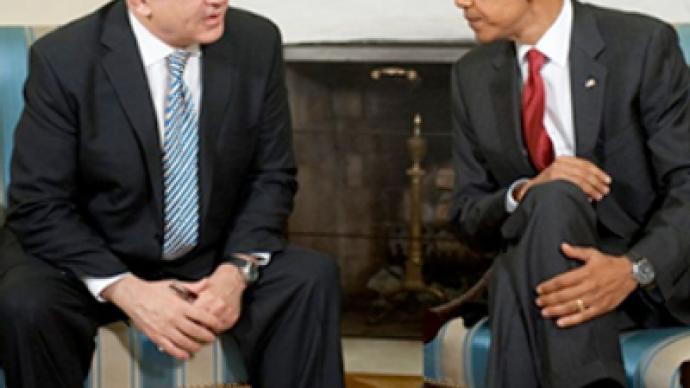Netanyahu in make-or-break Washington visit

Israeli President Benjamin Netanyahu, suffering on the global front after a string of setbacks, is meeting with US President Barack Obama in Washington to discuss a range of thorny issues.
As one of the wiliest and most experienced politicians in the world today, Netanyahu finds himself in Washington in a position that he is not remotely familiar with – that of a rather desperate politician in need of a political victory to boost his sagging popularity both at home and abroad.
Not only does Netanyahu need to mend Israel’s ties with Washington, but he is also looking to mend his own international image, which has taken a beating lately following Israel’s deadly clash with a Turkish-led aid flotilla on its way to Gaza, in addition to other high-profile scandals.
However, Barack Obama also finds himself in a risky political position, especially with crucial midterm elections fast approaching. Considering the number of Jewish-American voters (whose support of Israeli policies under Netanyahu, by the way, remain questionable), the American president needs to show that he supports Israel, yet will stick to his guns when the going gets rough.
“Obama and Netanyahu will try to gauge each other's political strength,” wrote Aluf Benn in Haaretz. “Obama needs a breakthrough to show the world that America is not lost. Netanyahu wants to reverse Israel's growing international isolation. This is the basis for an understanding.”
Israel’s veteran Likud leader, who served as prime minister once before from 1996-1999 (incidentally, also alongside a Democratic US president, William Jefferson Clinton), has always enjoyed enough of Washington’s unquestionable support to behave almost at will. And as a string of recent scandals seem to prove, Netanyahu is not overly interested in kowtowing to global opinion. Like any strong statesman, Netanyahu’s first interest is and will continue to be his nation’s security and wellbeing.
Nevertheless, Israel – regardless of the leader – needs to come to grips with the growing global conviction that the decades-long Palestinian stalemate needs to be resolved. As far as Netanyahu should be concerned, this means that it is no longer politics as usual.
Some analysts are already predicting that any chance of a successful meeting between Obama and Netanyahu hinge upon the perennial question as to what comes first: achieving Palestinian statehood, or taming Iran’s nuclear ambitions? It should come as no surprise that Netanyahu wants to address the “existential threat” of Tehran letting the nuclear genie out of the bottle, while Obama is demanding that Israel first resolve the longstanding Palestinian question of statehood.
And then there is the nagging feeling that the cunning Israeli leader is just buying political time in order to see through his plans.
With that said, Netanyahu on Sunday endorsed Washington’s call for direct talks between Israeli and Palestinian officials.
Addressing his Cabinet on Sunday, Netanyahu said the “time has come” for Palestinian President Mahmoud Abbas to get ready to meet with the Israelis “because there is no other way to advance peace. I hope this will be one of the results of the visit to Washington.”
Whether the two sides are heading for another time-consuming round of dead-end peace camps, or a real chance to create a lasting deal that all sides can agree to, remains to be seen. The more realistic-minded analysts predict that Netanyahu will formally commit himself to direct peace talks with the Palestinians, while demanding tougher action against Iran.
Israel and America’s strange new relationship
Today, the most positive thing that can be said about Israeli-American relationship is that it is unpredictable and, if behind-the-scene reports may be believed, far more contentious than ever before.
“Netanyahu and Obama have not yet managed to establish close and intimate working relations since taking leadership of their respective countries,” Haaretz, the Israeli daily, commented on the strained US-Israeli relationship. “The level of trust between the two appears very low, making it difficult to yield significant progress in the peace process.”
The chemistry between Obama and Netanyahu has always appeared forced and unnatural, and the so-called “special relationship” experienced the equivalent of a laboratory explosion when US Vice President Joe Biden paid a visit to Israel in March.
In Jerusalem, Biden trumpeted the “unbreakable bond” between Israel and the United States. No sooner had Obama’s right-hand man finished his glowing speech Israel’s Interior Ministry responded by announcing 1,600 new housing units for Jews in East Jerusalem, thus delivering a major setback to the latest effort at achieving a Middle East peace.
If Netanyahu was merely testing the mettle of the new White House, he probably got much more than he bargained for: An agitated and certainly humiliated Mr. Biden blasted the move as “precisely the kind of step that undermines the trust we need right now,” adding that “sometimes only a friend can deliver the hardest truth.”
Several weeks later, Netanyahu paid a visit to the White House where he was greeted by a frosty reception: there was no official photograph taken alongside his White House host, while an anticipated invitation to a White House dinner never arrived.
Here is how Fox News summarized the “Obama snub”:
“For a head of government to visit the White House and not pose for photographers is rare. For a key ally to be left to his own devices while the President withdraws to have dinner in private was, until this week, unheard of. Yet that is how Benjamin Netanyahu was treated by President Obama…according to Israeli reports on a trip viewed in Jerusalem as a humiliation.”
It is no wonder that so many Israelis report negative feelings for the US president.
According to the results of a telephone survey of 500 Israeli Jews conducted by Pechter Middle East Polls (PMEP) on June 7, 2010, 53% were satisfied with Prime Minister Netanyahu's job performance, while 71% disliked President Barack Obama, with 47% expressing a “strong dislike” for America’s first black president.
Incidentally, since the “Biden Incident,” Israel has placed a freeze on all Jewish settlement construction in East Jerusalem, but that moratorium is set to expire in September. One senior White House adviser, speaking on the condition of anonymity, said that Obama would try to get Netanyahu to extend the settlement freeze.
“A six-month freeze is really not what the Palestinians are looking for in the West Bank,” the official said. “They want a lasting peace and a state they can call their own. A moratorium on Jewish settlements simply means that one day the construction will continue and the hope of a Palestinian state will further subside.”
It must be said that much of Netanyahu’s troubles did not begin with Barack Obama.
No Turkish delight
The fallout with Washington now seems minor compared to what was heading toward Israel in the form of a Turkey-sponsored aid flotilla loaded down with a crew of 700, in addition to 10,000 tons of humanitarian supplies for Gaza, which has been struggling under the effects of an Israel embargo, now in its third year.
While the flotilla was still in international waters, Israeli marines engaged the ship, thus sparking a deadly confrontation that left nine pro-Palestinian activists dead.
Netanyahu defended the actions of the Israeli marines, saying his forces had been attacked: “They were mobbed, they were clubbed, they were beaten, stabbed, there was even a report of gunfire. And our soldiers had to defend themselves.”
Israeli media tended to support the claims, using video images that seem to prove that the Israeli marines were not confronting your average hippy humanitarian worker. Nevertheless, Turkey is demanding an apology from Israel, as well as an "open, transparent international investigation" into the incident.
Unfortunately, like the introduction of a freeze on Jewish settlements in East Jerusalem following a disagreement with the Obama White House, it took a deadly international incident to force Israel to back off on the Gaza embargo.
Such incidences create the impression, rightly or wrongly, that the government of Benjamin Netanyahu will only change its political mind when an almost unsustainable amount of pressure over an issue has accumulated. Such a strategy may have worked in the Middle Ages, but in a highly technological age of terrorism and nuclear weapons, it is no longer an agreeable way to come to terms with conflicts.
Thus, it would be much better if the government of Benjamin Netanyahu genuinely agreed to meet Washington at least halfway on Iran and peace in the Middle East, instead of waiting for the lid to blow on the next controversy.
After all, peace in the Middle East is not just in Israel's best interests, but in the best interests of the entire world.
For more RT coverage on Netanyahu's White House meeting, click here.













